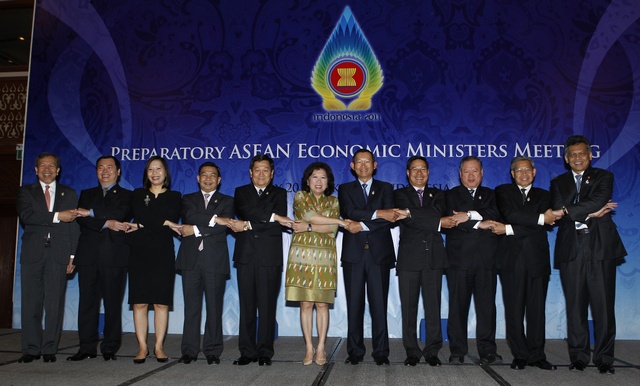PARIS — Ken Zaw, Burma’s Minister of National Planning and Economic Development, yesterday outlined challenges awaiting the Association of Southeast Asian Nations (ASEAN) as the region moves closer to regional economic integration.
Those challenges, he said, include equitable and sustainable development and inclusive growth.
Ken Zaw’s comments were received at the Southeast Asian Forum, held at the headquarters of the Organization for Economic Cooperation and Development (OECD) in Paris on Monday. He told international participants, which included several ministers from ASEAN, that the regional body is headed towards achieving an integrated ASEAN economic community (AEC) in 2015.
“We give full attention in equal share … in terms of economic growth and development,” he said, referring to the common goals of ASEAN.
Under Burma’s chairmanship, he said, ASEAN will strengthen small and medium enterprises, enhancing public-private partnerships for infrastructure.
Ken Zaw also praised the Economic Research Institute for ASEAN and East Asia (ERIA) for assisting in the country’s economic development and promoting competitiveness.
He lauded increased engagement between ERIA and the OECD as the two organisations entered into a memorandum of understanding (MoU) committing to collaborate in the region.
[related]
Ken Zaw said that the partnership would contribute to economic integration and good practices in the region.
“ASEAN and OECD have a long history of relations. We need to learn from the OECD experience,” he emphasised.
Ministers from ASEAN and dialogue countries, including Cambodia, Laos, Thailand, Indonesia, the Philippines, New Zealand and India, also took part in the forum. Each attendee brought country-specific prospects and challenges to the discussions about the forthcoming ASEAN economic community.
The ASEAN ministers congratulated OECD Secretary-General Angel Gurria for launching a Southeast Asian Regional Programme that would help to promote inclusive economic growth in the region.
Gurria reiterated that OECD has a long history of best practices among its members, and would like to share them with emerging economies.
Echoing Gurria, ERIA Executive Director Prof. Hidetoshi Nishimura said, “It is a historical moment for ERIA and OECD to forge a formal cooperation.” According to the MoU, both sides will cooperate on policy studies about public-private partnership in infrastructure development, global value chain, and various other issues.
The Paris meeting was held in advance of the upcoming 2014 ASEAN summit, which will be held in Burma’s capital city, Naypyidaw, on 10 – 11 May.
Burma assumed the ASEAN chairmanship in January 2014 for the first time since becoming a member of the regional bloc in 1997. Chairmanship is generally determined by rotation, which skipped Burma in 2006 because of fears that Western leaders would boycott meetings as the country was still under military rule and subject to severe sanctions.
The AEC is a plan for regional economic integration that will come into effect in 2015. The strategy is geared towards inter-regional technical support and infrastructural development, with the goals of improving production and promoting free movement of goods and capital throughout Southeast Asia.



